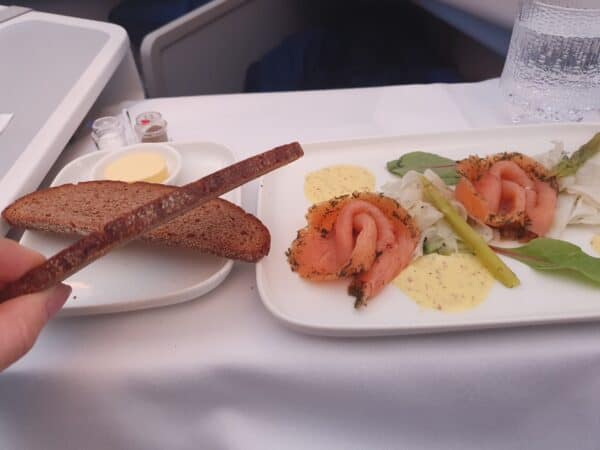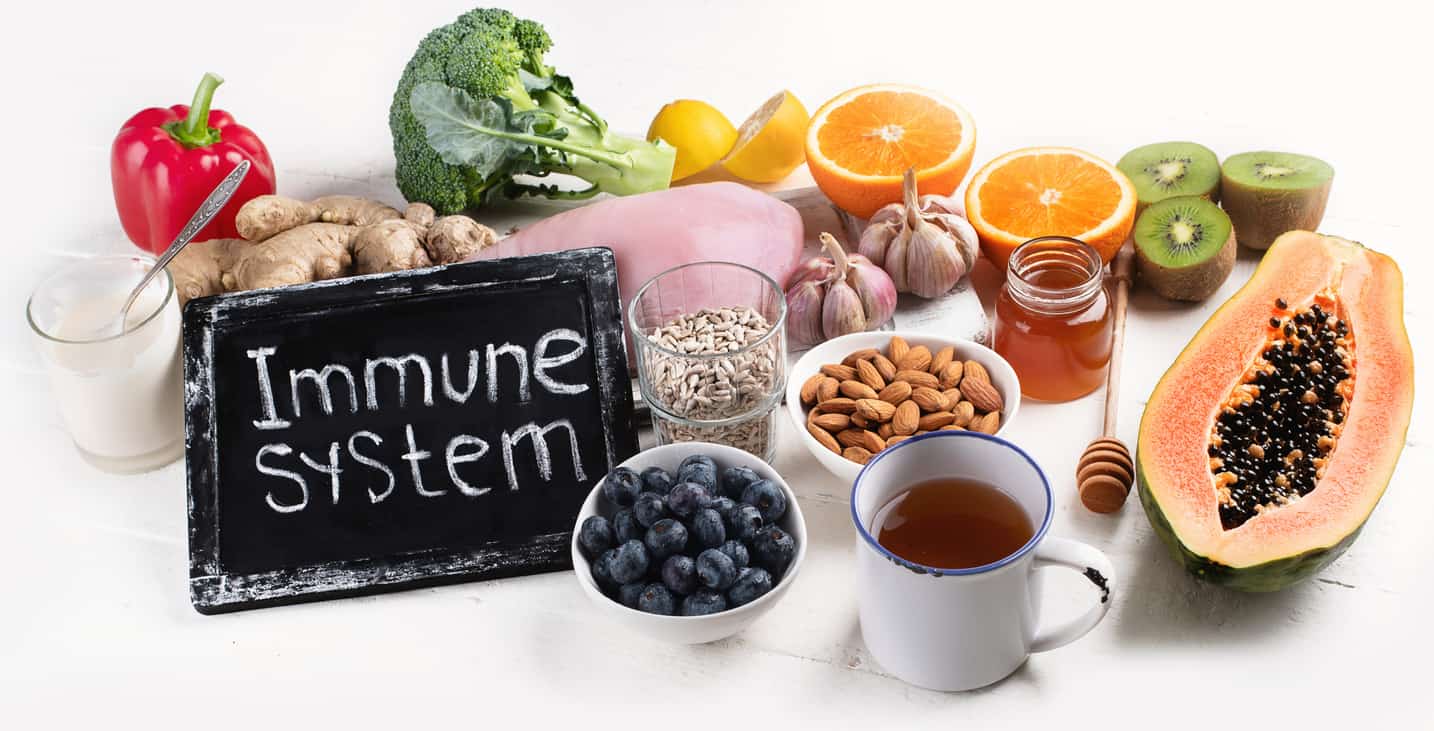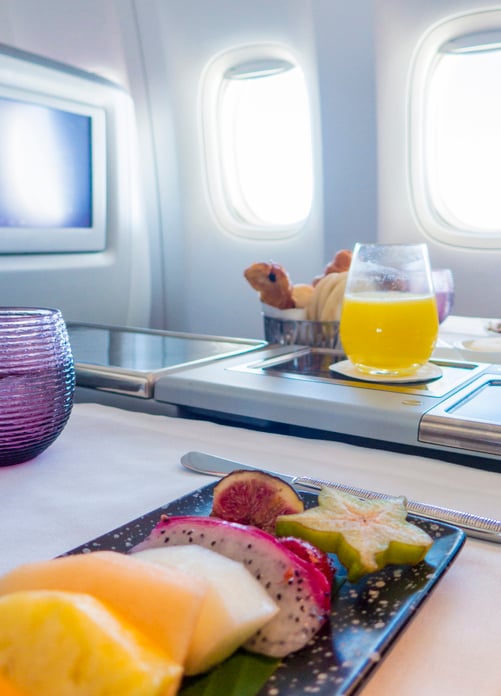The coronavirus that causes Covid-19 (Covid) is here to stay. Exactly what that will mean for travel in the future is not quite clear, however one thing is certain, people are starting to travel again either in their own country, or globally. While a requirement of travel in many countries is vaccination or proof of previous Covid infection, did you know eating well and having a healthy diet should also be top of your to-do-list while travelling to help play a role in staying well during this time. This is because one of the key factors that keeps our immune system functioning well is a healthy diet – good nutrition is essential for our immune system and helping it fight disease!
To help our immune system be the best it can, we need to ensure we have optimal intakes of a number of nutrients that play key roles in immunity. And if you travel frequently, paying attention to what you eat is needed to help ensure you are getting enough of these nutrients in your diet.
Nutrition and the immune system
It is well known poor nutrition can compromise the immune system and increase overall infection risk. So, it is vital we have an optimal intake of nutrients that play a role in immunity, to give our immune system the best chance of functioning well. In fact, in light of Covid there has been new research published that explores the role diet and nutrition status plays in disease development, such as respiratory diseases (including Covid). For example a recently published paper in 2021 explored diet quality, risk and severity of COVID-19, and concluded “a diet characterised by healthy plant-based foods was associated with lower risk and severity of COVID-19”. Now this research is not saying a plant-based diet will stop you getting covid, but it may provide us with more of an idea of how a diet rich in whole foods high in antioxidants, phytonutrients, vitamins and minerals may help reduce risk of developing covid.
There are a number of micronutrients (vitamins and minerals) known to play key roles in the immune system including vitamins A, C, D, E, B2, B6, B9 and B12, along with the minerals iron, selenium and zinc. And I know what you are thinking – wow that seems like a lot, and how much do I need to have of each of these nutrients each day? Well, this is a complicated question and will depend on a range of factors such as your age, gender, current diet, medical conditions, results of recent blood tests, and whether you are currently fighting an infection/illness (such as Covid).
But stick with me! Yes, I know this sounds complicated, and to fully tailor your nutrient intake to you personally, seeing a dietitian is a great place to start as this is what we do. (And no this isn’t a shameless plug for my services but to show you that all this complexity can be difficult to work through to know how much you should be having).
BUT there are ways you can start improving your nutrient intake yourself and work towards getting your optimal intake to give your immune system a great chance of working well, especially when you are travelling. Let’s take a look.
Which foods are good for supporting your immune system?
Ok lets take a look at which foods are sources of immune supporting nutrients:
- Vitamin D – sunshine, mushrooms (exposed to UV light), fish, eggs
- Folate (B9) – green leafy vegetables, broccoli, nuts, legumes
- Zinc – red meat, oysters and other seafood, chicken, legumes, nuts
- Selenium – nuts, Brazil nuts especially, cereals, mushrooms, and meats
- Iron – red meat, chicken, wholegrains, legumes
- Vitamin C – tomatoes, capsicum, citrus fruits, broccoli, berries
- Vitamin E – nuts, green leafy vegetables, oils
- Vitamin A – oily fish, egg yolks, cheese, tofu, nuts, seeds, whole grains and legumes. Orange coloured vegetables contain beta-carotene which can be converted to b=vitamin A in the body.
- Vitamin B12 – found in animal based products
- Marine based omega -3 fats (DHA and EPA) – fish, seafood and algae
While you might be reading this list and thinking tick, tick, tick – yes I eat most of these – it actually comes down to the amounts you eat, and how often you eat them. Having a diet mostly made up of whole foods is the first step to help you meet your requirements. Not only will it help get you well on the way to give you the nutrients you need, but also has additional health benefits because there are more components in foods than to than just vitamins, minerals and macronutrients that are good for you. There are also phytonutrients which are healthy and have benefits for supporting the immune system.

How can you eat well while travelling to support your immune system?
And to achieve this while travelling – eating a balanced diet rich in wholefoods which are minimally processed – can be difficult.
This is because most of the food is out of our control; planes have limited food menus, food courts at train and petrol (gas) stations typically have convenient takeaway foods that are highly processed, and room service meals don’t necessarily arrive hot or appetising.
We also have to remember that many foods served while traveling are pre-prepared and re-heated which may have an effect on the nutrient content of food. Basically, there may be less vitamins in the re-heated meal than the fresh version, and so you don’t necessarily get as much of the nutrition benefit.
So, what can you do eat while travelling to help make increase your nutrient intake and support your immune system?
Here are my first go to strategies while I am travelling:
- Always eat the side salad – and ask for a second one if there are some leftovers!
- Choose wholegrain bread roll/slice of bread instead of white/wholemeal
- Ask for nuts as a pre-drinks snack instead of crisps (chips) or pretzels
- Choose the cheese (if you are not lactose intolerant, allergic to dairy or vegan) or fruit plate for dessert
- Choose a fish dish where possible, especially salmon.
- Make up half your meal or snack with vegetables when in an airline lounge
And this is why I am always reviewing foods served while travelling and give advice on what I (as a dietitian) like about meals. It is because I always have things like this in the back of my mind, trying to help you make your food intake as nutritious as possible.

Your immune system and travelling
Forget Covid for the moment and let’s look at the immune system in general when travelling so you can see why you should always be eating well if you are a frequent flyer. When you travel on airplanes and across time zones, your immune system can be challenged. Not all details are fully understood yet, (more research is needed on exactly what the affects are and how often/how long you need to travel before the immune system becomes affected), but we do know if you travel regularly, some changes can happen to your body which may have affects on the immune system. Jet lag and changes to our body clock: travelling across time zones can affect our internal body clock and disrupt our circadian rhythms, which can affect how our immune systems responds to threats. Circadian rhythms play a large role in many body functions including sleep patterns, digestion and interestingly also our immune system. So as we travel and cross time zones there may be negative impacts on our immune system. There are other physiological affects of air travel on the body which may affect the immune system including dehydration and changes in the gut.
And so even prior to covid, it is important to eat well to support your immune system while travelling.
Can I boost my immune system before travel?
Ok, so while we know certain nutrients are essential for your immune system to work well, unfortunately there is no diet or supplement that can immediately ‘boost’ the immune system before travel. Supplements can be useful for people who are deficient or have dietary requirements which make it hard to meet nutrient intake needs. However, if you are already having adequate amounts, having more doesn’t necessarily mean your immune system will all of a sudden work better or be ‘boosted’.
But don’t despair, that doesn’t mean there is nothing we can do, or that supplements are not useful for staying healthy.
There are a number of things we can do to support our immune system while travelling:
- Don’t just think about needing to get a nutrient boost right before you travel, make sure you have a really healthy baseline diet all the time.
- Think ahead about your trip – if you know it is going to be busy and that eating well may be hard then supplements may be useful when travelling to replace a nutrient poor diet for a short period of time (until you get back to your routine).
- Stay hydrated while on the plane and make sure you are hydrated before you start travelling.
- Try not the have any carbonated/fizzy drinks while flying to help reduce bloating.
- Have at least 3 different colour vegetables at each meal.
- Eat foods regularly that are important for good gut health including foods that are a good source of resistant starch and prebiotics, other high fibre foods, and fermented foods.
If you would like more tailored recommendations to you that provide you with the nutrient levels you need to support your immune system, then contact me for an appointment.
Sources
- https://www.nnedpro.org.uk/covid-19nutrition-resources
- https://www.cam.ac.uk/research/news/time-of-day-influences-our-susceptibility-to-infection-study-finds
- https://www.sciencedaily.com/releases/2020/10/201014141138.htm
- https://theconversation.com/5-ways-nutrition-could-help-your-immune-system-fight-off-the-coronavirus-133356
- https://www.ncbi.nlm.nih.gov/pmc/articles/PMC4090048/
- https://www.ncbi.nlm.nih.gov/pmc/articles/PMC7551461/
- https://nutrition.bmj.com/content/early/2020/05/20/bmjnph-2020-000085
- https://www.nature.com/articles/s41430-021-00949-8.pdf
- https://www.hsph.harvard.edu/nutritionsource/nutrition-and-immunity/



